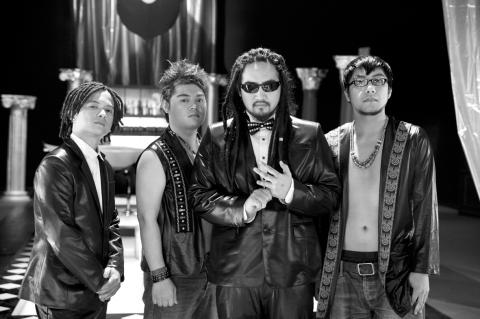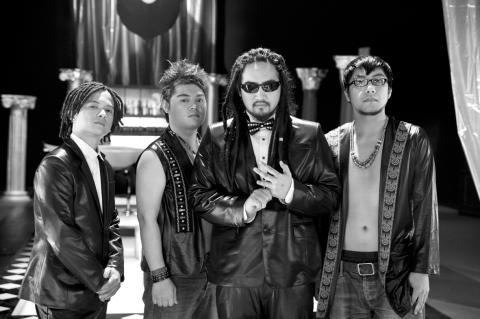Reggae just might find its way into Taiwan’s pop mainstream, thanks to Aboriginal singer-songwriter Matzka (瑪斯卡), who performs tonight at Riverside Live House (西門紅樓展演館).
The 28-year-old Taitung County native, who just released a debut CD, has been a word-of-mouth sensation since winning a government-sponsored songwriting contest several years ago.
In 2009, Matzka and his four-piece band won the top prize at the Ho-Hai-Yan Rock Festival’s (貢寮國際海洋音樂祭) annual battle of the bands contest, considered a stepping stone to fame for Taiwan’s best indie rock artists. They also landed a spot as the opening act for Guns N’ Roses’ concert in Taipei that same year.

Photo courtesy of Arrival Music
Matzka has been seen in a handful of TV show appearances and several flashy music videos, including one for his signature song, Ma Do Va Do (Like a Dog, 像狗一樣) , the video for which has racked up more than 100,000 hits on YouTube.
Despite his shoulder-length dreadlocks and his band’s reggae-heavy grooves, Matzka insists that his main influence lies in the traditional songs of his Paiwan (排灣) ancestry.
He tried to downplay the cross-genre stylings of his music when he spoke to the Taipei Times on the phone from Taitung earlier this week.

Photo courtesy of Arrival Music
“At that time, I didn’t know that [my music would sound like] reggae,” he said of writing his first songs. “I only knew that when I did it, it felt good, very smooth.”
“Of course my reggae is not so pure ... but anyway it just has that sound. And we’ve added some rock elements to it,” he said.
Matzka says he grew up listening to Spanish folk and Latin jazz at home and with friends, and hip-hop and reggae.
But he never expected to be using Caribbean rhythms when he started learning guitar and writing songs five years ago. He says it was the Paiwan language that led him there.
“I’ve tried many styles and I think [reggae] felt the most suitable,” Matzka said.
Indeed, on Ma Do Va Do, which earned Matzka a songwriting prize for best Aboriginal song, the Paiwan language lends itself well to his rapid-fire “toasting,” the rap-like chanting heard in dancehall music.
The language, at least in the way Matzka sings it, has a few sounds similar to the vowels and rolling R’s heard in Spanish.
Ma Do Va Do happens to be an exception in his repertoire. As he is not “100 percent fluent” in the Paiwan language, Matzka sings most of his songs in Mandarin, which presented another challenge.
“I found it was hardest to sing in Chinese, because the language sounds stiff and square. But when I added my [Aboriginal] accent to sing it, I found that it became smooth and sounded good,” he said.
Indigenous pride is one theme in Matzka’s song No K, in which he laments the mindless aping of American hip-hop culture among kids in Taiwan’s Aboriginal communities. One line goes, “At the end of the day, are you from the tribe, or are you from Brooklyn?” (到底是來自部落還是布魯克林區).
But the lyric that tends to elicit cheers from live audiences is “Taiwanese people sing Taiwanese songs!” (台灣人唱台灣歌), after which Matzka and his bandmates break into a traditional Aboriginal melody.
“Foreigners’ cultures are very cool, very beautiful,” he said in explaining why he wrote the song. “But our own culture is also very beautiful. Our languages are disappearing and the situation is serious. A lot of young people can’t speak their mother language. I’ve always thought this was a pity, and that we have to do something right away to preserve them.”
For his part, Matzka says he aims to record an album in the future that’s completely sung in his mother language.
For now, the Taipei-based singer appears to be grooming for stardom, starting with some name changes. His backing band, composed of fellow Taitung natives from both the Paiwan and Puyuma (卑南族) tribes, have dropped their moniker De Hot and now perform as simply Matzka (瑪斯卡樂團).
“It’s easier to remember and it suits us,” said Matzka, who declined to give his Mandarin name, although the Taiwan embassy in Paraguay listed it as Sung Wei-nung (宋唯農) in an online press release. (The band played a show in Asuncion in October last year as part of an official cultural exchange).
Matzka’s self-titled debut CD, released three weeks ago, has already sold more than 4,000 copies, according to his label and management company Arrival Music (有凰音樂). It’s an impressive figure for a Taiwanese indie artist, assuming the number is accurate.
If Matzka’s momentum keeps up, it’s not just reggae grooves that could percolate into the mainstream, but an Aboriginal language — Ma Do Va Do is certainly catchy enough for radio listeners.
Matzka says he hopes that just as a song sung in English can hold popular appeal among Mandarin speakers in Taiwan, so could a song sung in the Paiwan language.
“Even if people can’t understand it, they can still have fun singing it. I don’t feel language is the most important — the most important is to make people feel something,” he said.

June 23 to June 29 After capturing the walled city of Hsinchu on June 22, 1895, the Japanese hoped to quickly push south and seize control of Taiwan’s entire west coast — but their advance was stalled for more than a month. Not only did local Hakka fighters continue to cause them headaches, resistance forces even attempted to retake the city three times. “We had planned to occupy Anping (Tainan) and Takao (Kaohsiung) as soon as possible, but ever since we took Hsinchu, nearby bandits proclaiming to be ‘righteous people’ (義民) have been destroying train tracks and electrical cables, and gathering in villages

Dr. Y. Tony Yang, Associate Dean of Health Policy and Population Science at George Washington University, argued last week in a piece for the Taipei Times about former president Ma Ying-jeou (馬英九) leading a student delegation to the People’s Republic of China (PRC) that, “The real question is not whether Ma’s visit helps or hurts Taiwan — it is why Taiwan lacks a sophisticated, multi-track approach to one of the most complex geopolitical relationships in the world” (“Ma’s Visit, DPP’s Blind Spot,” June 18, page 8). Yang contends that the Democratic Progressive Party (DPP) has a blind spot: “By treating any

Swooping low over the banks of a Nile River tributary, an aid flight run by retired American military officers released a stream of food-stuffed sacks over a town emptied by fighting in South Sudan, a country wracked by conflict. Last week’s air drop was the latest in a controversial development — private contracting firms led by former US intelligence officers and military veterans delivering aid to some of the world’s deadliest conflict zones, in operations organized with governments that are combatants in the conflicts. The moves are roiling the global aid community, which warns of a more militarized, politicized and profit-seeking trend

This year will go down in the history books. Taiwan faces enormous turmoil and uncertainty in the coming months. Which political parties are in a good position to handle big changes? All of the main parties are beset with challenges. Taking stock, this column examined the Taiwan People’s Party (TPP) (“Huang Kuo-chang’s choking the life out of the TPP,” May 28, page 12), the Democratic Progressive Party (DPP) (“Challenges amid choppy waters for the DPP,” June 14, page 12) and the Chinese Nationalist Party (KMT) (“KMT struggles to seize opportunities as ‘interesting times’ loom,” June 20, page 11). Times like these can